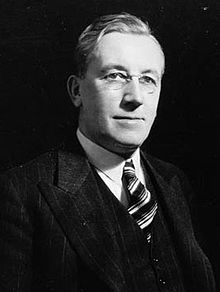M. J. Coldwell | |
|---|---|
 | |
| 2nd Leader of the Co-operative Commonwealth Federation | |
| In office July 29, 1942 – August 10, 1960 | |
| Preceded by | J. S. Woodsworth |
| Succeeded by | Hazen Argue |
| 2nd National Chairman of the Co-operative Commonwealth Federation | |
| In office 1938–1942 | |
| Preceded by | J. S. Woodsworth |
| Succeeded by | F. R. Scott |
| Member of Parliament for Rosetown—Biggar | |
| In office October 14, 1935 – March 30, 1958 | |
| Preceded by | New Constituency |
| Succeeded by | Clarence Owen Cooper |
| 1st National Secretary of the Co-operative Commonwealth Federation | |
| In office 1934–1936 | |
| Preceded by | new office |
| Succeeded by | David Lewis |
| 1st Leader of the Saskatchewan Co-operative Commonwealth Federation | |
| In office 1932–1936 | |
| Preceded by | new office |
| Succeeded by | George Hara Williams |
| Member of the Regina City Council | |
| In office 1922–1932 | |
| Personal details | |
| Born | Major James William Coldwell December 2, 1888 Seaton, Devon, England |
| Died | August 25, 1974 (aged 85) Ottawa, Ontario, Canada |
| Political party | |
| Spouse |
Norah Dunsford Coldwell
(m. 1912) |
| Children | 2[1] |
| Residence(s) | Ottawa, Ontario, Canada |
| Occupation |
|
Major James William Coldwell [a] PC CC (December 2, 1888 – August 25, 1974) was a Canadian democratic socialist politician, and leader of the Co-operative Commonwealth Federation (CCF) party from 1942 to 1960.
Born in England, he immigrated to Canada in 1910. Prior to his political career, he was an educator and union activist. In 1935, he was elected to the House of Commons of Canada, representing the Rosetown—Biggar electoral district. He was re-elected five more times before he was defeated in the 1958 Diefenbaker sweep. He became the CCF's first national secretary in 1934 and became its national leader upon the death of J. S. Woodsworth in 1942. He remained leader until 1960, when there was a parliamentary caucus revolt against him. When the CCF disbanded in 1961, he joined its successor, the New Democratic Party.
Coldwell is remembered mainly for helping to introduce "welfare state" policies to Canada, by persuading the Canadian government to introduce an Old Age Security programme and child benefits during the mid-1940s. He turned down several offers to join the governing Liberal Party of Canada, including one offer that would have made him Prime Minister. After his defeat in 1958, he was offered an appointment to the Senate, but he declined this as well. In 1964 he was sworn into the Privy Council, and in 1967 he was one of the initial inductees into the Order of Canada.
- ^ Estorick, Eric (1945). "Preface". Left turn, Canada; with an introduction by Eric Estorick. New York: Duell, Sloan and Pearce. p. viii.
Cite error: There are <ref group=lower-alpha> tags or {{efn}} templates on this page, but the references will not show without a {{reflist|group=lower-alpha}} template or {{notelist}} template (see the help page).